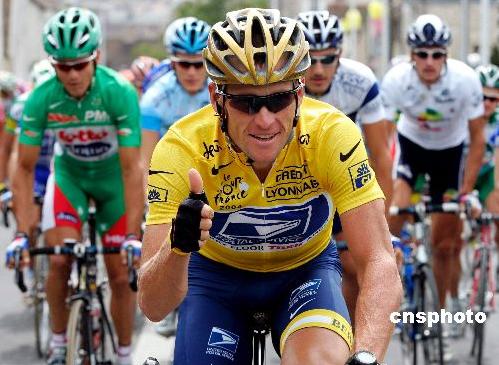Professional cycling is set for a much-needed injection of star power after Lance Armstrong announced he is ending his three-year retirement in an effort to win the Tour de France for an eighth time.

In a formal statement on Tuesday, the 36-year-old Armstrong described his comeback as an attempt to raise global awareness in his fight against cancer.
Just as likely, it's also about his relentless desire to compete and win, especially at the Tour de France, the race he won a record seven times from 1999-2005.
Citing the slow pace of last year's Tour and the rush from competing in last month's domestic Leadville 100 race, Armstrong decided it was time to return to the Tour in 2009.
"This kind of obscure bike race, totally kick-started my engine," he told Vanity Fair in an exclusive interview, referring to the lung-searing 100-mile mountain bike race through the Colorado Rockies. "I'm going to try and win an eighth Tour de France."
Armstrong's riveting victories over cancer and opponents on the bike, his work for cancer awareness and his gossip-page romances have made him a modern-day American icon.
Professional cycling, and particularly the Tour, has missed Armstrong, even though skeptics refused to believe he could win without the help of illegal performance-enhancing substances.
This time, Armstrong, who turns 37 next week, is determined to silence the doubters and try to prove he really is clean.
He's even hired a video crew to chronicle his training for 2009, as well as his drug tests, for a possible documentary.
"There's this perception in cycling that this generation is now the cleanest generation we've had in decades, if not forever," said Armstrong, who's never tested positive. "And the generation that I raced with was the dirty generation. ... So there is a nice element here where I can come with really a completely comprehensive program and there will be no way to cheat."
And if he has his way, no way to lose.
"We're not going to try to win second place," said Bill Stapleton, Armstrong's lawyer and longtime confidant.
Diagnosed in 1996 with testicular cancer that had spread to his lungs and brain, doctors gave Armstrong less than a 50 percent chance of survival. Surgery and brutal cycles of chemotherapy saved his life.
From there, it was determination and powerful self-discipline that led him back to the bike and his stunning 1999 Tour win.
Armstrong's goal every year was to win the Tour, and he dominated the Pyrenees and Alps. This time, he says he wants to win for his millions of supporters and the 8 million who will die of cancer just this year.
On his foundation's Website, Armstrong said details of the comeback -- such as a team and schedule - will be announced on September 24 at the Clinton Global Initiative in New York.
"I think it's great," said longtime teammate George Hincapie. "He's done more than anyone for the sport, especially in America and around the world."
(Agencies via Shanghai Daily September 11, 2008)